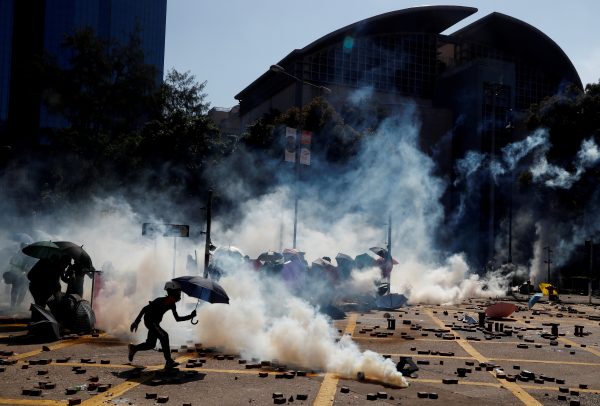The protests and the response from authorities have brought the city to its knees. There has been violence, death, mass arrest and misinformation. The economy is contracting with the recession deeper than expected, hotels half empty, universities under siege, retail seriously hurt and transport routinely disrupted. But the pro-democracy opposition won a sweeping victory in the city’s district elections at the end of November, highlighting public support for the protest movement.
The protest movement is leaderless — by design — and the initial demand to withdraw the extradition bill has been met. The other four demands, including amnesty for the arrested protestors and universal suffrage, will be harder for the administration to meet. The reform hurdles for universal suffrage are high and in fact it was the opposition legislators that vetoed change in 2014.
Kerry Brown sums up the situation in Hong Kong in this week’s lead essay explaining that it’s ‘as though a whole generation had become wedded to protest at whatever the cost and the administration which was meant to supply security had run out of ideas’. As the protests and response from authorities escalated, ‘even the political overlords in Beijing sometimes seemed at a loss for what to do’.
Beijing has avoided direct intervention, which would provoke significant international backlash. It is unlikely to back down to the protestors but intervening would invite a mess in Hong Kong and have huge international consequences. Beijing can afford to wait it out with the military force on show across the border.
How long can the fragile situation continue? As Brown explains, ‘2019 resolved nothing. It has just postponed things until 2020’. The longer the crisis continues, the more damage to Hong Kong.
At stake is the welfare of the people of Hong Kong and the importance the city carries for prosperity and security in East Asia. Hong Kong has a unique and strategic importance as a gateway into the mainland for the West, with its familiar institutions. And for China, beyond the issue of sovereignty, Hong Kong is where companies and policymakers can learn governance and finance at the technological frontier — lessons that can be used to power the mainland economy.
What makes Hong Kong special for China and the rest of the world is diminished the longer the crisis continues.
In November the US Congress passed an act committing to support freedom and democracy in Hong Kong, further complicating the great power rivalry and strategic competition between China and the United States. Large-scale protest movements and their responses have crippled major cities in 2019 but none involve the stakes of the two global superpowers quite like Hong Kong.
The United States has involved itself in the Hong Kong issue but what can other governments do? There’s plenty to lose in getting involved in the lose-lose crisis. Tim Summers wrote back in October that other countries need to understand the full range of views across the Hong Kong community, not just those who lobby Washington, London and Canberra. It means ‘giving some support to the Hong Kong government and encouraging it to find the right balance between interests in Hong Kong and those in Beijing’. Most importantly of all, ‘this wave of violence must come to an end’, else ‘Hong Kong’s society may never recover’.
Beijing wants the protests and disruption to stop. The protestors want their demands met. There will have to be a middle ground where both sides save face and a process is put in place that can rebuild society.
Hong Kong and China will operate as ‘one country, two systems’ until 2047 when the 50 year agreement with the British that is enshrined in Hong Kong’s constitution lapses. What happens after that is not clear and there is a lot that will change in the meantime. In the 22 years since the British handover of Hong Kong to China, much has changed, especially in China.
In 2047 China will be a different country. Its economy will be the largest in the world. But whether it has achieved its dream of becoming prosperous and high income will most likely depend on whether it is able to reform its economy and its political institutions. The success of these reforms will also shape Hong Kongers’ attitudes about relations with the mainland.
We’d like to thank you, our loyal readers — especially as you read this in the height of the holiday season — for your support this year, our twelfth. We have a team of top ANU students who make EAF hum along as they edit, post, email and innovate. Our editorial team of faculty from ANU does this out of love. Your readership is important, as are our authors and peer reviewers.
From the team at EAF, wishing you a safe and happy holidays.
The EAF Editorial Board is located in the Crawford School of Public Policy, College of Asia and the Pacific, The Australian National University.


Hong Kong was taken from China by the British. They had no right to the territory. It was a typical abuse of colonial power. Until the changeover the Hong Kong citizens had no right to vote. All major decisions were made in London. Were the changeover to occur today there would be no lengthy transition. That was entirely a reflection of relative Chinese weakness at the time. It is ironic and revealing that the current protestors (more accurately criminal vandals) are brandishing the American and British flags. One should compare the relative fates of Hong Kong and Macau following their handover on the same dates. The latter has flourished and is blessedly free of US and British interference. Hong Kong is a classic example of a campaign by declining western powers to undermine China.